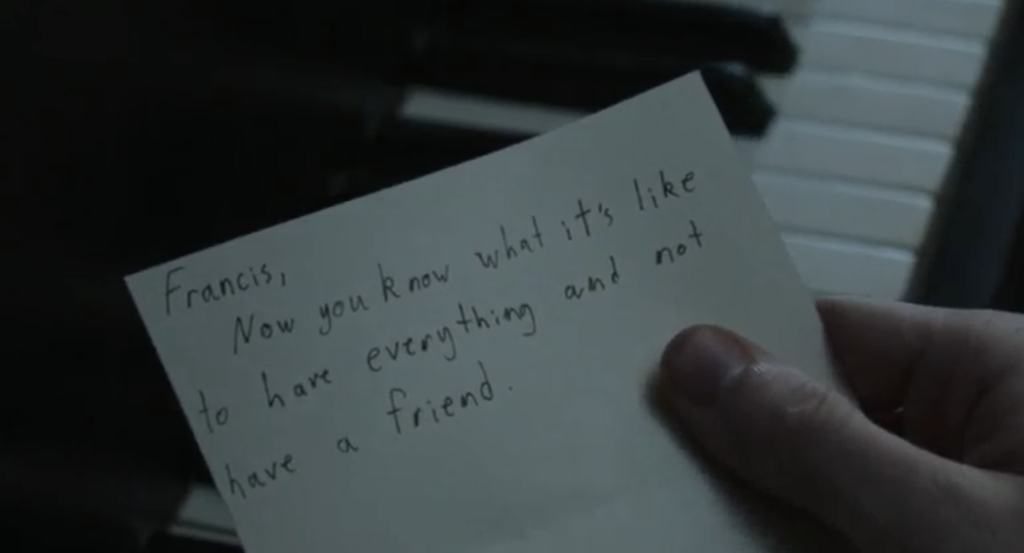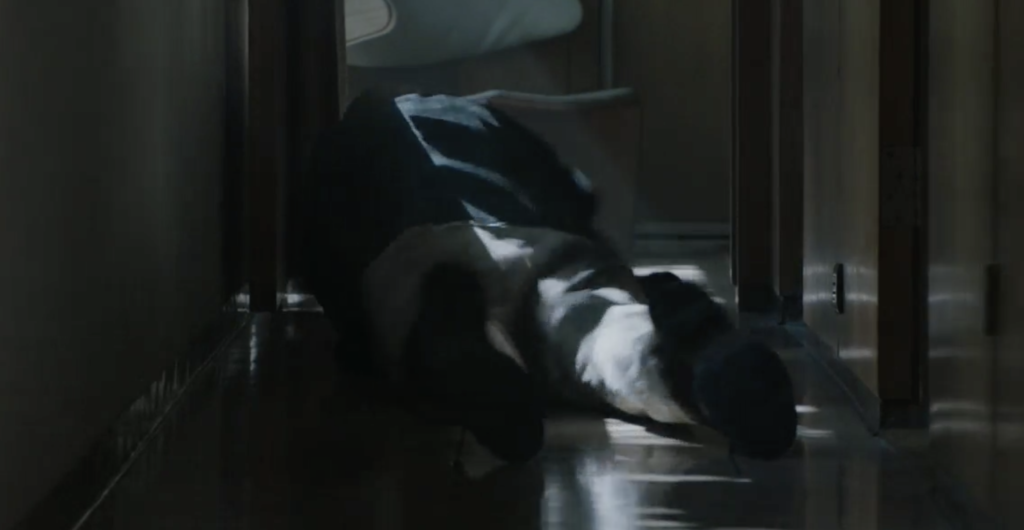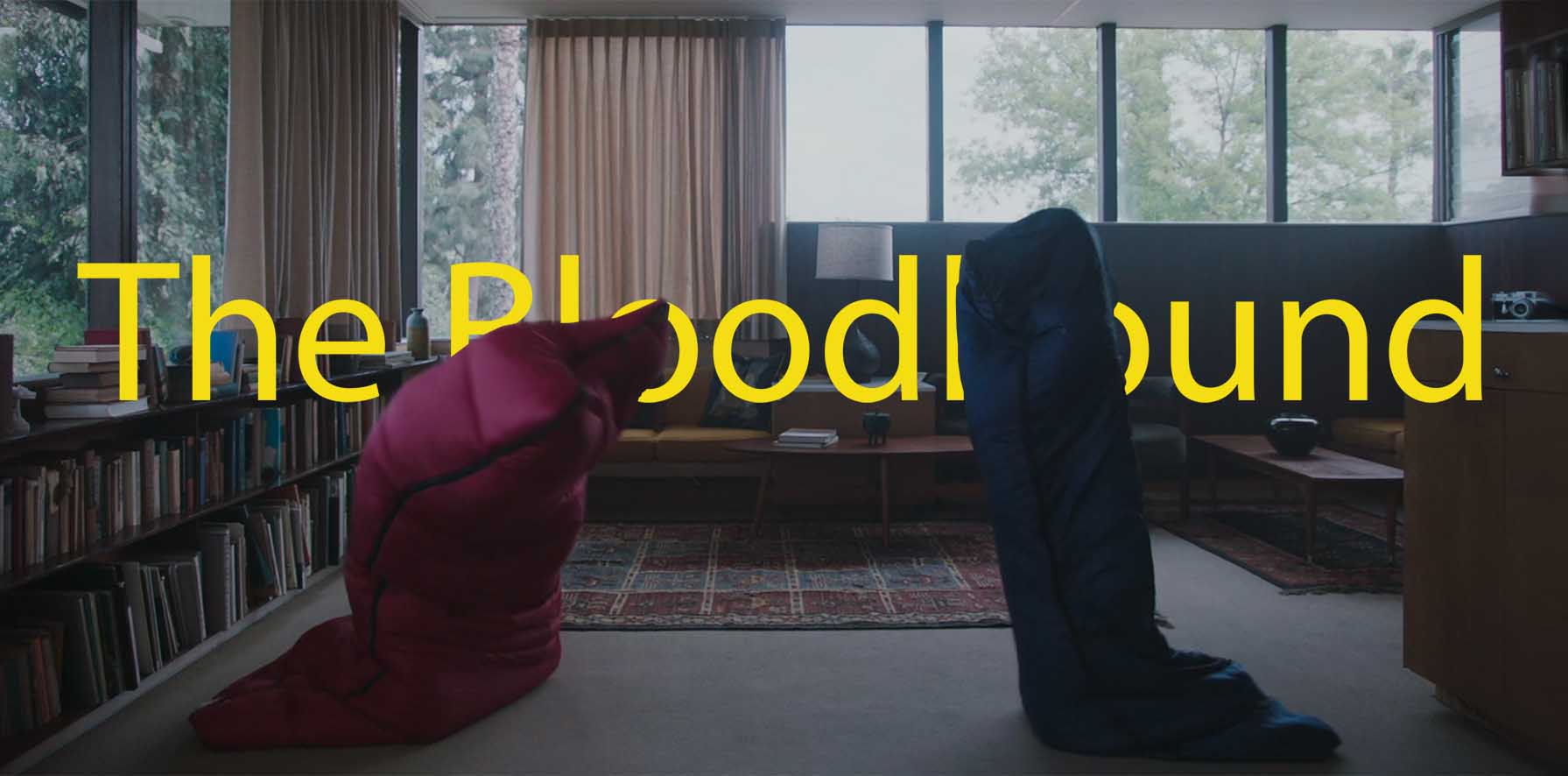Sometimes I find myself drawn magnetically to more abstract, avant-garde type films. Well, that is what we have here today folks. An extraordinarily abstractgarde film. So abstract, and so mental, that it might not be able to be understood without all of us putting our minds together in order to figure it out together. Right? We up for this project? Because I’m going to need your help as much as you need mine. But I think we can pull this off. OK, so let’s Unravel The Bloodhound Movie Together.
Closed box movies always get more of my attention than any other movie type. Why? Because they rely on superior writing, fantastic dialog, and clever pacing in order to hold the attention of the audience. Today though, The Bloodhound actually relies on something else entirely for us to totally appreciate what is going on here. What is that extra 4th wall? That would be Edgar Allen Poe. More specifically, his short story, The Fall of the House of Usher. I was about half way through the film when I realized exactly what was going on – and realized I couldn’t remember the short story well enough, so I went back and reread the story. Yeah…
The Bloodhound Walkthrough
The movie tells the story of JP, a rich agoraphobic, who has invited his childhood friend, Francis, to the house. The circumstances of the invite are curious, as it seems like JP doesn’t intend for Francis to ever leave. He isn’t locked in, per se, but it’s clear Francis isn’t expected to leave. The two spend their time talking, and dancing a dance about what it is that they really want out of life. Eventually it becomes clear that JP has a sister, named Vivian, and she is not doing well at all. JP has locked her away, and he expects Francis to leave her alone. Eventually, Vivian comes to Francis to tell him that he needs to get out of the house. Otherwise Francis will “die like the rest of them.”
What could she be talking about? There in the living room are four urns containing various family members who have died previously – JP’s parents, and his grandparents. It isn’t 100% clear. But we do know that JP says that his grandmother drank herself to death in the house. It seems as though that something incredibly untoward is happening in the house. We watched in the opening as a man with bag over his head, crawled on the floor and took up residence in one of the house’s closets. And as the movie continues, occasionally the house will shake as the man inside slams against the doors. At one point, the bloodhound crawls out of the closet and physically accosts the food in the refrigerator. Who is this bag-headed man? What is he doing taking up residence in this house? And how does he continue to gain power the longer he stays?
JP – “It feels like my head is being squeezed by a demon.”
As the story barrels towards its natural and obvious conclusion, Francis steals JP’s stash of money threatening their uneasy peace that they have somehow erected. But it later made clear that JP knew that he had taken the money because the house always knows everything that happens within it. What does that even mean?
Later, Francis tells JP that he had a dream. And in this dream, Vivian died. And as a result, he put her down in the vault in the basement. But that during this dream, he sort of got the idea that she wasn’t dead at all. So he ran to the vault, and sure enough, she wasn’t dead, but she kissed him. After Vivian kissed him they fell to the ground dead. Interestingly…this is literally the layout of Poe’s story, The Fall of the House of Usher. The narrator is invited to the house, only to be asked to help bury the newly dead sister in the vault. Days later when the brother checks on the noise coming from the vault, he learns that his sister wasn’t dead at all.
What’s interesting about this dream that Francis has, is that it holds a place in the story that was originally filled by the narrator reading the story called The Mad Tryst. It is a novel that tells the story of a knight named Ethelred who comes to a hermit’s home in order to get out of a storm. But the knight quickly finds that the home is really a palace of gold guarded by a dragon. Ethelred kills the dragon with his mace, and takes the magical shield of brass. And, as the story is read, there are sounds heard in the house that correlate with the violence in the story that sort of portends of some other evil in the house of Roderick Usher. Similarly, Francis, our narrator, finds himself trapped in this home with a strong evil intent on his downfall. But what does this downfall look like? His death? Maybe. Let’s see where the story ends up.
Let’s Unravel The Bloodhound Movie Together
As the movie lurches towards its obvious ending, Vivian comes to Francis one last time and tells him, “I know that the dead are happier than the living, and those that have not been born are happier as well.” With that she kisses him and the whole house and the closet shake. Soon after, JP tells Francis that his sister passed away in the night. That he’d been given permission to keep her body in the vault until she is to be cremated. (WHAT? How can this even make one iota of sense?)
Watching as JP pontificates about his fears of residing on the ocean’s floor for eternity, he considers the fact that his entire life he has wondered what the point of this life is all about. That he had hoped it would eventually add up to something. And that JP was really hoping for everything to be new, that life would be full of mystery all over again. As Francis holds JP, he admits to the fact that he stole the money from JP. JP tells Francis that he knew all along, but needed to hear it from him. With that, JP locks Francis in, and heads quickly down to the vault to join his sister. Francis takes the elevator, and finds the two there in the vault, dead.
As the movie ends, Francis learns that he is the only person named in JP’s will. He now owns the house and everything that previously belonged to JP. And there is one final note that JP left him:

Uh. What? Congratulations friend! You have all my money and nary a friend in sight!! You are cursed to live and die like I did…completely unmoored and totally alone.
It’s interesting to note that if we dive into the literary seed that birthed this film we can’t be 100% certain of JP and Vivian’s differentiation. In the story (Roderick and Madeline) are hardly differentiable. Heck, it can be argued that they are literally the same person. We never really get a good feel for Madeline’s (or Vivian’s) reality. And it could be argued that one is just the alter ego of the other. And when Madeline dies, she obviously never really died because she is Roderick. If we look at Poe’s epigraph to the story we might learn a bit more of where Patrick Picard might be going with The Bloodhound.
“Son coeur est un luth suspendu;
Sitot qu’on le touche il resonne.
Translation:
“His/her heart is a poised lute;
as soon as it is touched, it resounds”.
These lines point out a heart that is so lonely, and so needy for touch, that it would resound, or explode at the first embrace. The entire story focuses on the themes of isolation. The house is sentient, and actively warding off all comers, actively invoking isolation. Why? Because the point of the story is how utterly alone these characters are, or by extension, we are. The writer and director takes this point one step further by saying to Francis… Congratulations buddy! You are now rich beyond your wildest imaginations…and yet you are condemned to be horribly unhappy regardless.
Funny, I just had a thought. So, I’m not poor. I’m actually pretty well off from a global standpoint. But I have bills and a mortgage to consider. Right? As most people do. Imagine that you were so rich that you didn’t have any debt. In fact, imagine you were a billionaire, and while you were sitting in your glorious home, you would pine for something to purchase that would be exciting. Something bigger, something better, something extraordinary to make the emptiness of it all go away. And yet, what is there? A new car? A new phone? These are all pittances in the grander scheme of things. Thinking through that lens, it now makes much more sense to watch as billionaires spend insane amounts of money on crazy things. But it just hit me just how empty that existence really would be. Empty in comparison to the gloriousness of a friend or a soul mate.
That is the real question here. Are JP and Francis really friends? Acquaintances surely. But real friends? No. Not from what I can see. JP seems to be manipulating Francis into staying. He doesn’t confer with Francis about having his things shipped from Burbank. He seems more an abductee than a friend. Worse, JP seems hellbent on attempting to relive the glory days of his youth. To recreate some sense of wonder and excitement for the world that has already long since gone. Ultimately, worse than the ennui and general despair was JP’s fear of the great beyond. The settling at the bottom of the sea for millennia alone.
Final Thoughts on The Bloodhound
I am not sure I really enjoyed The Bloodhound per se. But it made me think. And you know how much I enjoy movies that force me to consider life, the universe, and everything. My favorite aspect of the movie was the only real addition to the movie that didn’t really have a correspondent in Poe’s story… and that was the man in the closet.

In Poe’s story, the house is alive. It’s Roderick (and Madeline, his alter ego), the Narrator, and the House. A triumvirate. And in The Bloodhound, it is JP (Vivian as his alter ego), Francis, and the Bloodhound (or the house as his alter ego). The Bloodhound is just an alter ego of the house. A physical manifestation that speaks to the house’s powers that work to effect the occupants in a metaphorical way. I loved the visual of the The Bloodhound dragging himself up out of the riverbed and into the house, then into the closet. From there he cast his spell on the inhabitants. Leaching from them their semblance of autonomy.
Otherwise though, the story was an awkward envisioning of Poe’s classic. Yes, I think a modernist take was a good idea, but the acting was stiff and bizarre. And I’m totally all about avant-garde film! But this seemed weird to me… not just artistic. Regardless, it made me think, and caused me to really consider the really important things in life all around me. You guys, my close friends and acquaintances, my family. These are the things that this movie has driven me back into the the arms of. Otherwise, are we left to be preyed upon by The Bloodhound?
Edited by: CY



